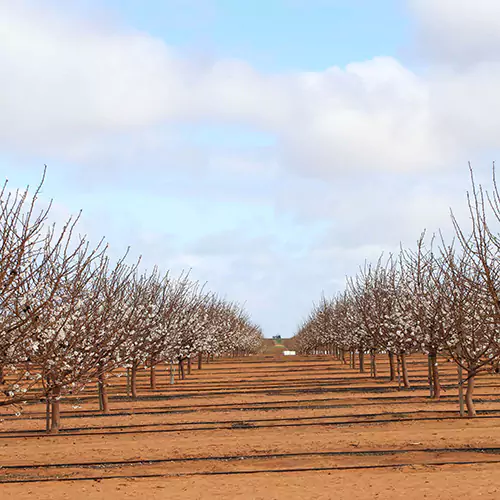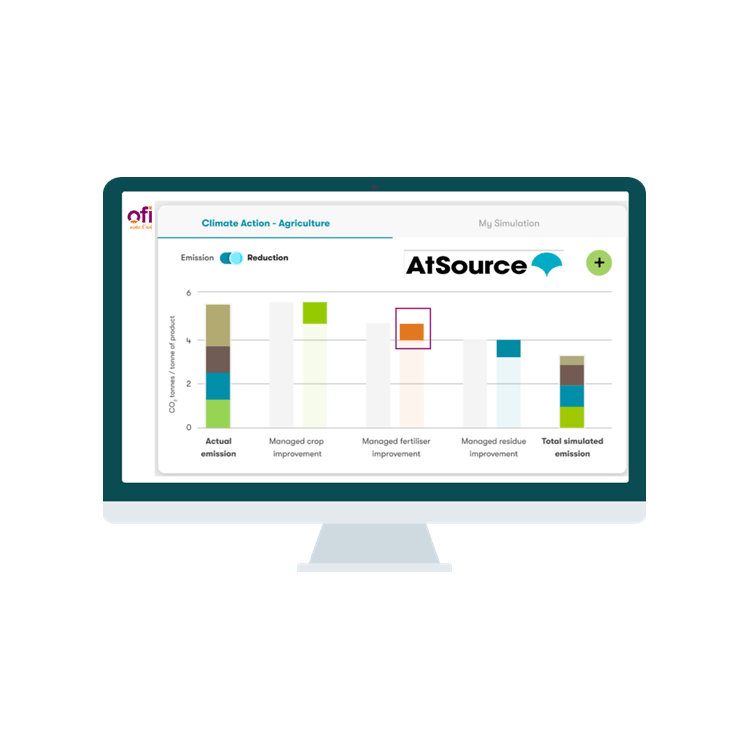Impacts of climate change, like drought, heatwaves and flooding, may affect crop yield and quality. That’s a threat to farmers, businesses and consumers alike. To bring about real change, we’re working hard across the supply chain, finding ways to reduce emissions and sequester carbon — as well as helping our customers meet their own targets.
Emissions on farms (Scope 3) are by far the biggest part of our footprint. We work closely with farmers to incentivize and apply climate-smart practices and our award-winning Carbon Scenario Planner—built into AtSource – is allowing us to model and recommend the most cost effective way to reduce or remove carbon. Beyond the farm, we’re finding ways to reduce Scope 1 and 2 emissions in our processing facilities with the introduction of renewable and clean energy initiatives including biomass boilers.
Here's what we're doing:
- Carbon footprint and hotspot analysis via the AtSource Digital Footprint Calculator (DFC).
- Helping customers to cut carbon using ofi's Carbon Scenario Planner to plan and cost climate actions.
- Building resilience with climate-smart agriculture (CSA): Supporting farmers to improve yields and crop health to generate cost savings and reduce GHG emissions.
- Participation in sector alliances such as the Cocoa & Forests Initiative, Agriculture Sector Roadmap to 1.5°C, Global Coffee Platform and Food and Land Use Coalition to scale our impact.
- Reducing emissions in our facilities: Increasing circularity and mazimizing renewable energy use in selected ofi Tier 1 & 2 sites.
Reporting on our progress
Progress against our climate action goals is reported in our Group 2023 Annual Report and dedicated product strategies: Cocoa Compass, Coffee LENS, Nut Trails and Dairy Tracks.
Updates for 2023 include:
- Recognition for ofi's digital climate action tools
- Assessing Natural Capital costs in coffee operations
- Developing circular solutions to tackle waste
Monitoring through AtSource+
AtSource+ allows customers to calculate their total carbon footprint by measuring 28 different metrics across the supply chain, from the farm through to processing and final delivery. We measure the carbon emissions associated with factors like land-use change, fertilizer, electricity and machinery use, and transportation, as well as how much carbon is sequestered in soil and trees.
The metrics we track include carbon emissions (tonnes CO₂-e) related to: Soil and tree carbon sequestration, deforestation over a 20-year period, pesticide and fertilizer production and use, irrigation, processing, and transport to destination.
To address the complexity of tackling Scope 3 emissions which make up the bulk of the food and beverage industry’s carbon footprint, ofi’s climate footprinting experts have developed an award-winning Carbon Scenario Planner (CSP) built into our sustainability management system AtSource.
The CSP allows ofi to model the outcome of different decarbonization interventions tailored to local contexts, so it can work with its customers to plan and cost out climate actions. It helps ofi's customers tackle the complex and challenging issue of Scope 3 emissions which occur in a company’s value chain and make up the bulk of the food and beverage industry’s carbon footprint.
Many of our customers struggle to access the high-quality and consistent data needed to track carbon fluctuations annually and help determine where to channel resources. So we partnered with Google geo-spatial partner NGIS to develop an AI-powered Carbon Stock Monitoring and Measurement tool. This tool, also accessible on AtSource, allows us to scale our analysis across our global sourcing countries, and help our customers better understand the impact of interventions like agroforestry and shade tree planting on carbon capture and compare these results across different plots of land.
Read ofi news
Equally, as with some other supply chains in emerging markets, low incomes among smallholder coffee growers can mean that they encroach into forest to grow more coffee to increase yields.
Forests are vital to sustainable cocoa production. Not only do they help to improve biodiversity and mitigate against climate change, they also help to improve cocoa yields and raise farmer incomes. By improving tree cover, cocoa farmers can increase the yields and life expectancy of their cocoa trees and generate additional income from more diverse crops.
Olam Spices’ dried onion program has been in operation since 1943. Our agricultural team has unparalleled expertise in the industry, boasting a combined 470 years of experience overseeing all aspects of seed breeding, planting, cultivation and harvest.
- Nuts – USA
- Specialty Coffee – UK
- Specialty Coffee – USA
- Specialty Coffee – EU
- Spices – USA
- deZaan Cocoa - USA
- Nuts – USA
- Specialty Coffee – UK
- Specialty Coffee – USA
- Specialty Coffee – EU
- Spices – USA
- deZaan Cocoa - USA
Copyright © 2024
Olam International Limited. All Rights Reserved. Co Reg No: 199504676H







